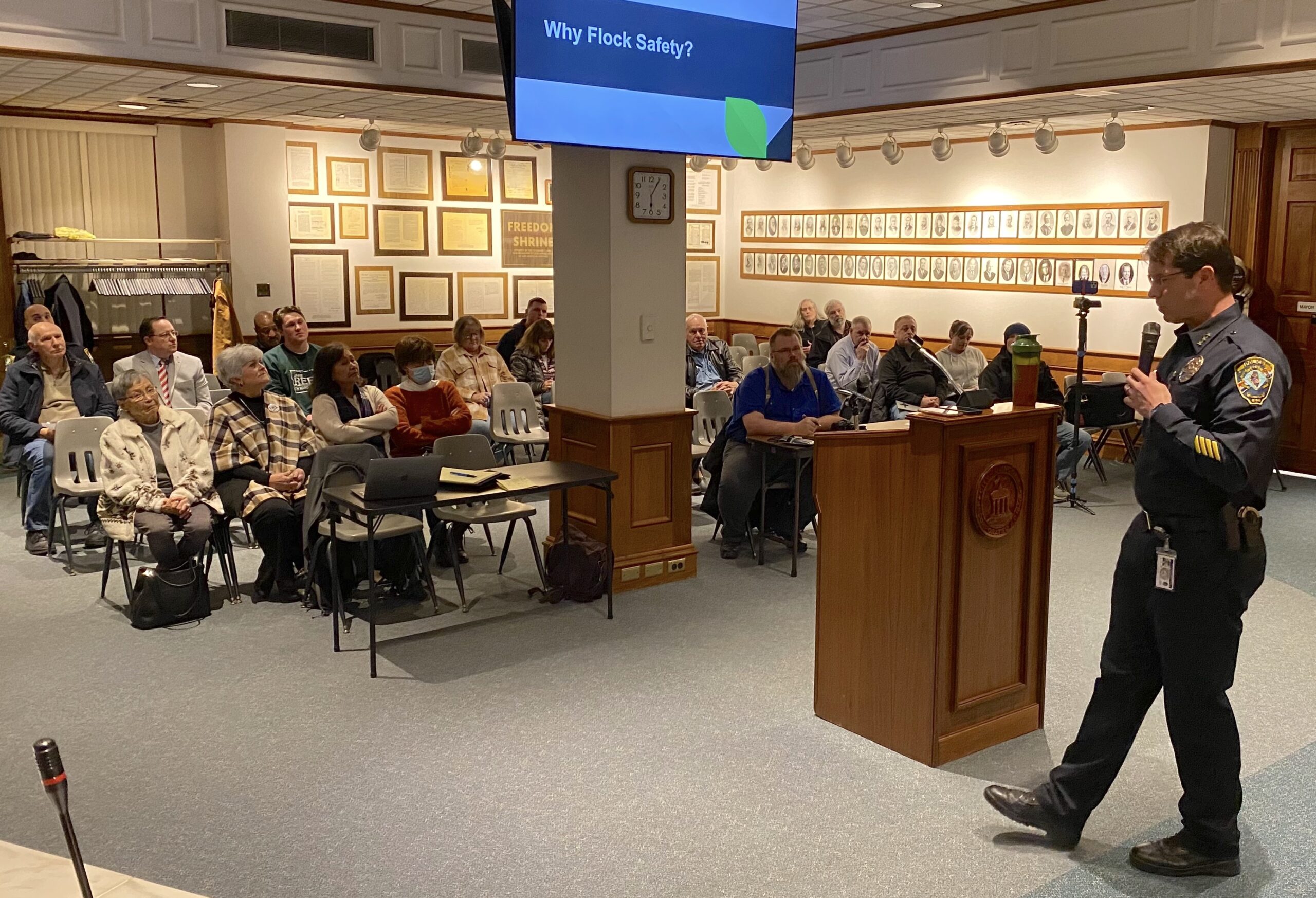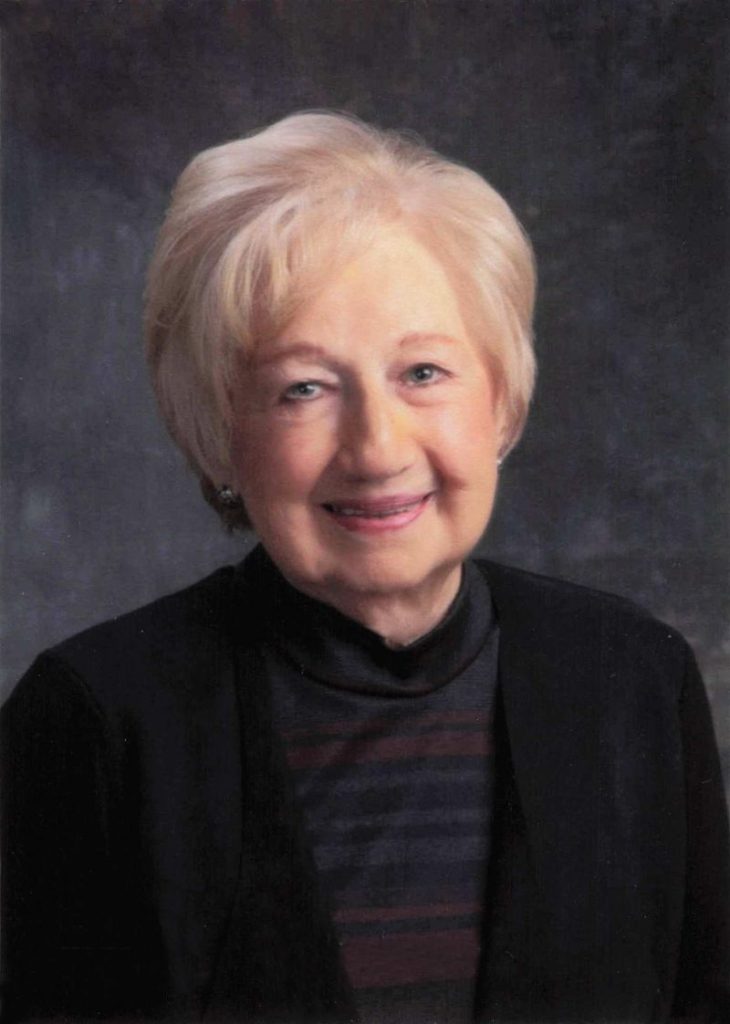Yates has no plans to reduce manpower if City Council approves license plate reader cameras

QUINCY — Adam Yates, chief of the Quincy Police Department, spent most of Monday’s public meeting in City Council chambers explaining what license plate reader cameras can’t do.
Afterward, he said he wasn’t willing to sacrifice the positions of paid officers in exchange for the new technology.
Yates spoke to approximately 30 people about the cameras. A proposal introduced at the Jan. 17 Police Aldermanic Committee meeting called for spending $117,600 on a two-year lease for 20 cameras to be placed around the city.
The technology Yates is recommending is from Flock Safety, a company founded in 2017. It sells automated license plate recognition technology to law enforcement agencies. The cameras read license plates and the makes/models of cars, then send photo alerts to law enforcement officers. Yates said the cameras are simply used to collect information — if a vehicle is reported as stolen or if a vehicle is registered to a person who is wanted.
“Flock’s mission is to eliminate crime for the whole community,” Yates said. “I will tell you that I’m always very careful when I say, ‘We’re going to eliminate crime.’ I think it would be crazy to think we’re going to completely eliminate crime, but a lot of times in the law enforcement world, what we try to do is to make crime go other places.”
The Quincy Police Department is down nine officers from what it was budgeted, and Yates expects three retirements in 2023.
“We’re trying to hire officers, but we can’t hire officers fast enough to replace the ones who are leaving,” Yates told the crowd. “We’re finding ourselves spread pretty thin.”
Asked after the meeting if implementation of the technology would mean he might be asked to reduce manpower requests, Yates replied, “I’ve not been asked to reduce manpower in our budget, and I don’t plan to offer to reduce manpower in our budget.”
The City Council likely will review the proposal within the next couple weeks. Another public forum is scheduled for 6 p.m. Wednesday at the Quincy Police Department’s Sub Post at Quincy Town Center.
Yates said the Flock Safety technology does not:
- Take photos of people
- Take video
- Use facial recognition
- Assist with traffic enforcement
- Assist with predictive policing
- Allow for connection to registration data or third-party databases (such as Carfax or the Department of Motor Vehicles)
- Retain data for more than 30 days unless it is associated with a crime
He first learned about Flock Safety’s technology in March or April of last year, saying he was “blown away.” However, Rob Copley was the chief of the department at the time. Yates was named chief in May.
“At one point, I had an officer come to me and said, ‘Hey, Chief, do you mind if I start doing some research into license plate readers?’” Yates said. “I told him it was a good idea and to contact Flock Safety. (The officer) says, ‘Well, I’ve already talked to somebody from Flock Safety. They’ve got a pretty decent product. A couple of weeks later, I had a detective sergeant get a hold of me and say, ‘Hey, have we ever thought about getting license plate readers?’ I said we were having some conversations, and he said, ‘I talked to a guy from the Quad Cities. They have Flock Safety, and they think it’s absolutely terrific.’
“Then (Deputy Chief) Mike Tyler goes to a canine conference and ends up talking to a guy from Georgia who’s showing them all the cool stuff that Flock Safety does on a cell phone. Four officers all independently looking at license plate reader software, and all had information from the same company. That ultimately helped us when we made our decision to move forward.”
Yates believes Flock technology would have helped the Quincy Police Department solve three crimes — thefts at an ATM at 33rd and Maine, a shooting on Broadway and a robbery at the Zales Jewelry store — as well as a rash of catalytic converter thefts throughout the city. He also showed examples of how Flock technology helped police departments find missing seniors and kidnapped children in other cities.
Yates said he would propose for cameras to be installed at:
- Memorial Bridge
- Bayview Bridge
- Gardner Expressway at U.S. 24
- Broadway at the intersections of 18th, 24th, 36th and 54th
- 12th and Locust
- 24th and Wismann Lane
- Illinois 57 at R.J. Peters Drive
- 24th and Cherry Lane
- Eighth and Jefferson
- 36th and Harrison
- Fifth and Chestnut
Yates said the biggest concern he’s heard is the potential for an officer to misuse Flock technology in the future. He believes it’s his responsibility to ensure his department to use the technology for what it is intended.
“If we become aware that the technology is being used inappropriately, we absolutely have a requirement to end our relationship with the cop,” he said.
Yates also said businesses or neighborhoods could buy Flock cameras to combat crime, but only the police department would have access to the data.
John Werle, a 911 dispatcher for Adams County who attended the meeting, said he previously worked with Flock cameras for about eight years as a dispatcher in Cobb County in Georgia. He called the information provided by the cameras “invaluable.”
“It puts more (cameras) on the street than the number of officers we have,” Werle said. “When there was a crime, you had a directed and focused area where you would concentrate your efforts rather than aimlessly patrolling around.
“I’ve never seen anything negative about it. Unfortunately, we got so many hits in that big of an area that we didn’t have enough officers to follow up on them. What I did notice was the more that we were using it, the less we would have Flock hits. The news got out, even among the bad guys, that you need to avoid those areas where cameras are mounted. They’ll catch you.”
Eric Entrup and Greg Fletcher, aldermen in the city’s 1st Ward, were among five aldermen who listened to Yates’ presentation. Both believe the technology is worthwhile.
“(The presentation) kind of answered most of my questions about the privacy issues,” Entrup said. “It seems pretty simple, which is what I was kind of hoping for. I don’t want something taking pictures of people’s faces or a facial recognition thing. The whole thing is just focused on the backs of cars.”
“I’m more convinced than I was beforehand,” Fletcher said. “The respect to privacy and (the fact it’s) solely just a snapshot of the rear end of the car — no information on the drivers or anything — impressed me.”
Miss Clipping Out Stories to Save for Later?
Click the Purchase Story button below to order a print of this story. We will print it for you on matte photo paper to keep forever.

